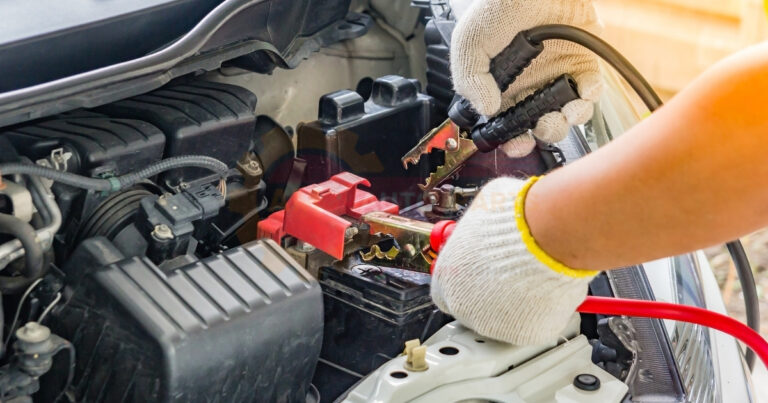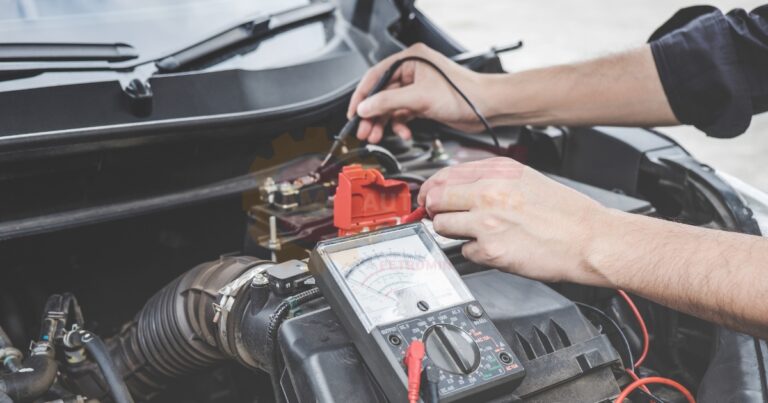Automotive Battery Maintenance: Essential Tips for Extending Your Car Battery Life
How Car Batteries Work
Car batteries are the heart of your vehicle’s electrical system. They store electrical energy and provide the necessary power to start the engine and run electrical components. When you turn the ignition key, the battery sends a burst of energy to the starter, which then cranks the engine. Once the engine is running, the alternator takes over, recharging the battery and powering the car’s electrical systems.
- Car batteries store and release electrical energy.
- They power the starter motor and electrical components.
- The alternator recharges the battery while driving.
Types of Automotive Batteries
There are several types of automotive batteries, each with unique features. The most common are lead-acid batteries, known for their reliability and affordability. Absorbent Glass Mat (AGM) batteries are another popular choice, offering better performance and longer life. Lithium-ion batteries, though less common in traditional vehicles, are gaining popularity in electric and hybrid cars due to their lightweight and high energy density.
- Lead-acid batteries: Reliable and affordable.
- AGM batteries: Better performance and longevity.
- Lithium-ion batteries: Lightweight and high energy density.
Average Lifespan of Car Batteries
The average lifespan of a car battery is typically between three to five years. However, this can vary based on factors such as driving habits, climate, and maintenance practices. Regular care and attention can help extend the life of your battery, ensuring it performs optimally for as long as possible.
- Average lifespan: 3-5 years.
- Influenced by driving habits and climate.
- Proper maintenance extends battery life.
Signs Your Car Battery Needs Attention
Slow Engine Start
A slow engine start is often the first sign that your car battery may need attention. If you notice the engine cranking more slowly than usual, it could indicate that the battery is losing its charge. Addressing this issue early can prevent more serious problems down the road.
- Slow cranking indicates a weak battery.
- Early attention prevents further issues.
- Regular checks can catch problems early.
Dimming Headlights
Dimming headlights are another common sign of a failing battery. If your headlights appear less bright than usual, especially when the engine is idling, it may be time to check your battery’s health. This issue can affect your visibility and safety on the road.
- Dimming lights signal battery issues.
- Affects visibility and safety.
- Check battery health if lights dim.
Electrical Issues
Electrical issues, such as malfunctioning power windows or erratic dashboard lights, can also point to battery problems. These issues occur when the battery cannot supply enough power to the car’s electrical systems, indicating a need for maintenance or replacement.
- Malfunctioning electronics suggest battery trouble.
- Insufficient power supply causes issues.
- Maintenance or replacement may be needed.
Battery Age
The age of your battery is a crucial factor in its performance. As batteries age, their ability to hold a charge diminishes. If your battery is over three years old, it’s wise to have it tested regularly to ensure it’s still in good working condition.
- Older batteries hold less charge.
- Regular testing for batteries over 3 years old.
- Age impacts battery performance.
Essential Car Battery Maintenance Tips
Regular Cleaning of Battery Terminals
Keeping your battery terminals clean is essential for optimal performance. Corrosion can build up on the terminals, hindering the flow of electricity. Regularly cleaning the terminals with a mixture of baking soda and water can prevent this buildup and ensure a strong connection.
- Clean terminals prevent corrosion.
- Baking soda and water mixture for cleaning.
- Ensures strong electrical connection.
Checking and Maintaining Fluid Levels
For batteries that require maintenance, checking and maintaining fluid levels is crucial. Low fluid levels can lead to overheating and reduced battery life. Regularly inspect the fluid levels and top up with distilled water if necessary.
- Maintain fluid levels to prevent overheating.
- Regular inspections are necessary.
- Use distilled water for topping up.
Proper Battery Securing
Ensuring your battery is securely fastened in its tray is vital. A loose battery can vibrate excessively, leading to damage and reduced lifespan. Regularly check that the battery is properly secured to avoid these issues.
- Secure battery to prevent vibration damage.
- Regular checks ensure proper fastening.
- Reduces risk of battery damage.
Avoiding Short Trips
Frequent short trips can prevent your battery from fully charging, leading to a shorter lifespan. If possible, combine errands to allow the battery to recharge fully during longer drives.
- Short trips prevent full charging.
- Combine errands for longer drives.
- Longer drives recharge the battery fully.
Protecting Your Car Battery in Extreme Weather
Cold Weather Battery Care
Cold weather can significantly impact your battery’s performance. In low temperatures, the battery’s chemical reactions slow down, reducing its ability to hold a charge. To protect your battery, park in a garage or use a battery blanket to keep it warm.
- Cold weather reduces battery efficiency.
- Park in a garage or use a battery blanket.
- Keeps battery warm and functional.
Hot Weather Battery Protection
High temperatures can also be detrimental to your battery. Heat can cause the battery fluid to evaporate, leading to damage. Parking in the shade and ensuring proper ventilation can help protect your battery from excessive heat.
- Heat causes fluid evaporation.
- Park in shade and ensure ventilation.
- Protects battery from heat damage.
Using Battery Insulators
Battery insulators can help maintain a stable temperature for your battery, protecting it from extreme weather conditions. These insulators are especially useful in regions with harsh climates, extending the life of your battery.
- Insulators maintain stable temperature.
- Useful in extreme climates.
- Extend battery life.
Proper Charging Techniques for Longer Battery Life
Avoiding Overcharging
Overcharging your battery can lead to overheating and damage. It’s essential to use a charger with an automatic shut-off feature to prevent overcharging and ensure your battery remains in good condition.
- Overcharging causes overheating.
- Use chargers with automatic shut-off.
- Prevents battery damage.
Using Smart Chargers
Smart chargers are designed to charge your battery efficiently and safely. They adjust the charging rate based on the battery’s needs, preventing overcharging and prolonging battery life.
- Smart chargers adjust charging rate.
- Prevent overcharging.
- Prolong battery life.
Trickle Charging for Stored Vehicles
If your vehicle is stored for an extended period, using a trickle charger can keep the battery charged without overcharging. This method is ideal for maintaining battery health in vehicles that are not driven regularly.
- Trickle chargers maintain charge in stored vehicles.
- Prevent overcharging during storage.
- Ideal for infrequently used vehicles.
Advanced Battery Care Strategies
Monitoring Battery Voltage
Regularly monitoring your battery’s voltage can help you catch potential issues early. A multimeter can be used to check the voltage, ensuring your battery is operating within the optimal range.
- Monitor voltage to catch issues early.
- Use a multimeter for checks.
- Ensures optimal battery operation.
Reducing Parasitic Drain
Parasitic drain occurs when electrical components continue to draw power even when the car is off. Reducing this drain by unplugging devices and turning off lights can help extend your battery’s life.
- Parasitic drain reduces battery life.
- Unplug devices and turn off lights.
- Extends battery lifespan.
Using Battery Maintainers
Battery maintainers are devices that keep your battery at an optimal charge level. They are especially useful for vehicles that are not driven frequently, ensuring the battery remains healthy and ready for use.
- Maintainers keep battery optimally charged.
- Useful for infrequently driven vehicles.
- Ensure battery health and readiness.
Choosing the Right Battery for Your Vehicle
Understanding Battery Ratings
Battery ratings, such as cold cranking amps (CCA) and reserve capacity (RC), are crucial for selecting the right battery. These ratings indicate the battery’s ability to start the engine in cold weather and how long it can power the vehicle if the alternator fails.
- CCA and RC are important ratings.
- Indicate starting power and reserve capacity.
- Essential for selecting the right battery.
Selecting the Correct Size and Type
Choosing the correct size and type of battery is vital for optimal performance. Consult your vehicle’s manual or a professional to ensure you select a battery that fits your car’s specifications.
- Correct size and type ensure performance.
- Consult manual or professional for guidance.
- Fit battery to car specifications.
Checking Manufacture Dates
The manufacture date of a battery can affect its performance. Newer batteries are more likely to perform better and last longer. Always check the manufacture date before purchasing a new battery.
- Newer batteries perform better.
- Check manufacture date before purchase.
- Affects battery performance and longevity.
DIY Battery Maintenance vs. Professional Service
When to Attempt DIY Maintenance
DIY battery maintenance can be a cost-effective way to keep your battery in good condition. Tasks such as cleaning terminals and checking fluid levels can be done at home with the right tools and knowledge.
- DIY maintenance is cost-effective.
- Clean terminals and check fluid levels.
- Requires proper tools and knowledge.
Signs It’s Time for Professional Help
There are times when professional help is necessary for battery maintenance. If you experience persistent issues or are unsure about the condition of your battery, it’s best to consult a professional to avoid further damage. Heavy machinery batteries power big construction equipment and industrial vehicles These special batteries are strong and long-lasting to keep heavy machines running all day Battery technology showdown New types of batteries fight to be the best for phones and cars showing which one can last longer and charge faster
Electric vehicle revolution is changing how we drive cars More people are choosing electric cars to help the environment BMS enhances longevity by helping our bodies work better and stay healthy for longer This system supports our cells and organs to function well as we age
Automotive power restoration challenges When a car’s battery dies or electrical system fails it can be tricky to get the power working again Mechanics need special tools and knowledge to fix these problems and get vehicles running Battery selection guide Choose the right battery for your device by looking at size voltage and how long it lasts
- Professional help for persistent issues.
- Consult if unsure about battery condition.
- Prevents further damage.
Eco-Friendly Battery Disposal and Recycling
Proper Disposal Methods
Proper disposal of car batteries is essential to prevent environmental harm. Batteries contain hazardous materials that can leach into the soil and water if not disposed of correctly. Always take your old battery to a recycling center or authorized disposal facility.
- Proper disposal prevents environmental harm.
- Batteries contain hazardous materials.
- Use recycling centers or authorized facilities.
Battery Recycling Programs
Many recycling programs are available to help dispose of car batteries responsibly. These programs ensure that batteries are recycled safely, reducing the environmental impact and conserving resources.
- Recycling programs ensure safe disposal.
- Reduce environmental impact.
- Conserve resources through recycling.
Environmental Impact of Car Batteries
Car batteries have a significant environmental impact if not disposed of properly. The lead and acid in batteries can contaminate the environment, making recycling and proper disposal crucial for sustainability.
- Improper disposal harms the environment.
- Lead and acid contamination risks.
- Recycling is crucial for sustainability.
FAQ’s
How often should I replace my car battery?
Car batteries should typically be replaced every three to five years. However, the exact timing can vary based on factors such as driving habits, climate, and maintenance practices. Regular testing can help determine when it’s time for a replacement.
Can I jumpstart a completely dead battery?
Yes, you can jumpstart a completely dead battery, but it may not hold a charge for long. If the battery is old or damaged, it may need to be replaced even after a jumpstart. It’s important to address the underlying issue to prevent future problems.
How long does it take to charge a car battery?
The time it takes to charge a car battery depends on the charger’s amperage and the battery’s capacity. On average, it can take anywhere from a few hours to a full day. Using a smart charger can optimize the charging process and prevent overcharging.






